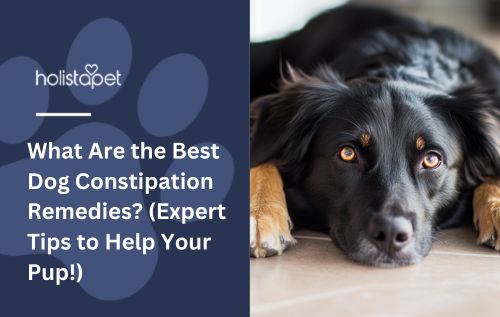If your furry friend is struggling to do their business, you’re not alone. Dog constipation is a common issue that can cause discomfort and even lead to more serious health concerns. But don’t worry! There are several effective remedies you can try at home to get your pup’s digestive system back on track. In this article, we’ll explore the best dog constipation remedies, when to seek veterinary help, and how to prevent future issues.

Understanding Dog Constipation
Dog constipation occurs when your pup has difficulty passing stool or hasn’t had a bowel movement in a couple of days. Common causes include dehydration, lack of fiber, insufficient exercise, or underlying medical conditions. Recognizing the signs early can help you take the right steps to relieve your dog’s discomfort.
Symptoms of Dog Constipation:
-
Straining to poop with little or no success
-
Hard, dry stools
-
Lethargy or discomfort
-
Loss of appetite
-
Whimpering while trying to defecate
Effective Dog Constipation Remedies
Here are some tried-and-true methods to help relieve your dog’s constipation:
1. Increase Fiber Intake
Adding fiber to your dog’s diet can help regulate digestion and promote bowel movements. Try:
-
Canned pumpkin (plain, unsweetened) – A natural source of fiber that dogs love.
-
Psyllium husk (Metamucil) – A small amount can add bulk to stools.
-
Bran or high-fiber dog food – Helps promote regularity.
2. Hydration Is Key
Dehydration can make constipation worse. Ensure your dog always has access to fresh water. You can also add water to their food or give them low-sodium chicken broth for extra hydration.
3. Exercise and Movement
Regular physical activity helps stimulate digestion. Take your dog for more walks, engage in active playtime, or try gentle belly massages to encourage bowel movements.
4. Healthy Oils for Lubrication
Adding a small amount of healthy fats can help ease stool passage. Try:
-
Olive oil or coconut oil – Mix a teaspoon into their food.
-
Fish oil – Supports digestion and provides additional health benefits.
5. Probiotics and Digestive Enzymes
Probiotics can improve gut health and help prevent constipation. Yogurt with live cultures (plain, unsweetened) or a vet-approved probiotic supplement can work wonders for your dog’s digestive system.
6. Vet-Approved Laxatives
If natural remedies don’t work, your vet may recommend a mild stool softener or laxative specifically formulated for dogs. Never give human laxatives without veterinary approval.
When to See a Vet
If your dog’s constipation lasts more than 48 hours or they show signs of severe discomfort, it’s best to consult your vet. Symptoms such as vomiting, bloating, or blood in the stool could indicate a more serious issue that requires medical attention.

Frequently Asked Questions (FAQs)
1. How long can a dog go without pooping?
Most dogs poop once or twice a day. If your dog hasn’t pooped for more than 48 hours, monitor them closely and try some home remedies. If the problem persists, consult a vet.
2. Can I give my dog milk for constipation?
While small amounts of milk might help some dogs, it can also cause diarrhea and stomach upset. It’s best to stick with safer remedies like pumpkin or fiber-rich foods.
3. Is olive oil safe for dogs with constipation?
Yes! A teaspoon of olive oil can help lubricate the digestive tract and ease stool passage. However, use it in moderation to avoid diarrhea.
4. What foods naturally relieve dog constipation?
Pumpkin, sweet potatoes, cooked carrots, and green beans are great natural options to add fiber and promote healthy digestion.
5. Should I worry if my dog strains but doesn’t poop?
Yes. If your dog is straining excessively without success, they could be suffering from an obstruction or another serious issue. Consult a vet if this happens.
Final Thoughts

Constipation in dogs is usually temporary and treatable with simple dietary and lifestyle adjustments. Ensuring your pup stays hydrated, eats a fiber-rich diet, and gets enough exercise can go a long way in preventing digestive problems. If home remedies don’t work within a couple of days or your dog appears to be in distress, don’t hesitate to contact your veterinarian.
By taking proactive steps and understanding your dog’s digestive needs, you can help keep your furry friend happy, healthy, and free from discomfort!
If you found this article helpful, share it with fellow dog parents! For more pet care tips, be sure to explore our blog for expert advice on keeping your pup in top shape.







![Probiotics For Dogs [Soft Chews] - HolistaPet](http://www.holistapet.com/cdn/shop/files/Probiotic-Infographic-1_472d7a29-e30c-435a-9638-1365d8c3a9f9.jpg?v=1725384841&width=104)


























Leave a comment
All comments are moderated before being published.
This site is protected by hCaptcha and the hCaptcha Privacy Policy and Terms of Service apply.